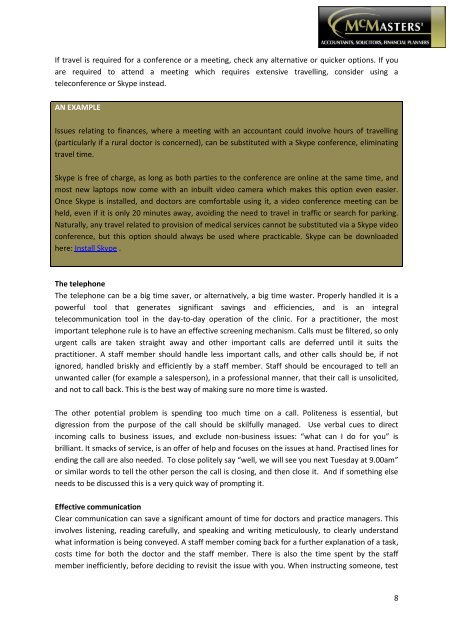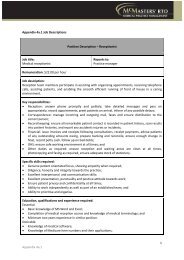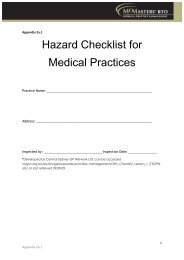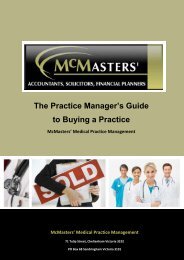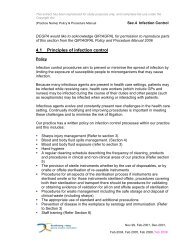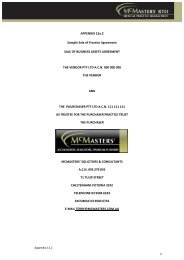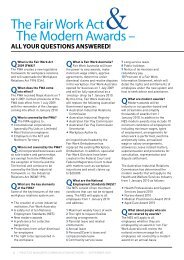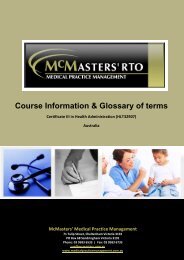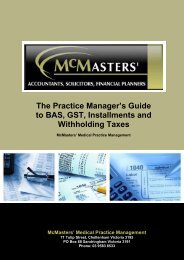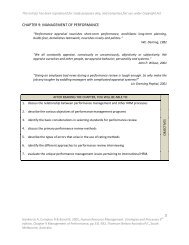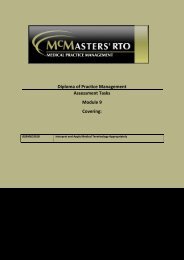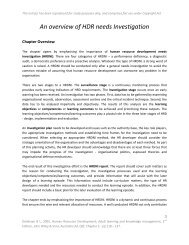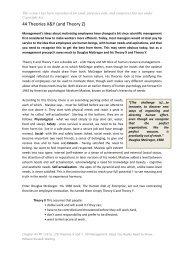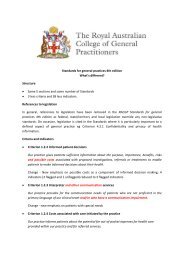The Practice Manager's Guide to Time Management
The Practice Manager's Guide to Time Management
The Practice Manager's Guide to Time Management
Create successful ePaper yourself
Turn your PDF publications into a flip-book with our unique Google optimized e-Paper software.
If travel is required for a conference or a meeting, check any alternative or quicker options. If youare required <strong>to</strong> attend a meeting which requires extensive travelling, consider using ateleconference or Skype instead.AN EXAMPLEIssues relating <strong>to</strong> finances, where a meeting with an accountant could involve hours of travelling(particularly if a rural doc<strong>to</strong>r is concerned), can be substituted with a Skype conference, eliminatingtravel time.Skype is free of charge, as long as both parties <strong>to</strong> the conference are online at the same time, andmost new lap<strong>to</strong>ps now come with an inbuilt video camera which makes this option even easier.Once Skype is installed, and doc<strong>to</strong>rs are comfortable using it, a video conference meeting can beheld, even if it is only 20 minutes away, avoiding the need <strong>to</strong> travel in traffic or search for parking.Naturally, any travel related <strong>to</strong> provision of medical services cannot be substituted via a Skype videoconference, but this option should always be used where practicable. Skype can be downloadedhere: Install Skype .<strong>The</strong> telephone<strong>The</strong> telephone can be a big time saver, or alternatively, a big time waster. Properly handled it is apowerful <strong>to</strong>ol that generates significant savings and efficiencies, and is an integraltelecommunication <strong>to</strong>ol in the day-<strong>to</strong>-day operation of the clinic. For a practitioner, the mostimportant telephone rule is <strong>to</strong> have an effective screening mechanism. Calls must be filtered, so onlyurgent calls are taken straight away and other important calls are deferred until it suits thepractitioner. A staff member should handle less important calls, and other calls should be, if notignored, handled briskly and efficiently by a staff member. Staff should be encouraged <strong>to</strong> tell anunwanted caller (for example a salesperson), in a professional manner, that their call is unsolicited,and not <strong>to</strong> call back. This is the best way of making sure no more time is wasted.<strong>The</strong> other potential problem is spending <strong>to</strong>o much time on a call. Politeness is essential, butdigression from the purpose of the call should be skilfully managed. Use verbal cues <strong>to</strong> directincoming calls <strong>to</strong> business issues, and exclude non-business issues: “what can I do for you” isbrilliant. It smacks of service, is an offer of help and focuses on the issues at hand. Practised lines forending the call are also needed. To close politely say “well, we will see you next Tuesday at 9.00am”or similar words <strong>to</strong> tell the other person the call is closing, and then close it. And if something elseneeds <strong>to</strong> be discussed this is a very quick way of prompting it.Effective communicationClear communication can save a significant amount of time for doc<strong>to</strong>rs and practice managers. Thisinvolves listening, reading carefully, and speaking and writing meticulously, <strong>to</strong> clearly understandwhat information is being conveyed. A staff member coming back for a further explanation of a task,costs time for both the doc<strong>to</strong>r and the staff member. <strong>The</strong>re is also the time spent by the staffmember inefficiently, before deciding <strong>to</strong> revisit the issue with you. When instructing someone, test8


